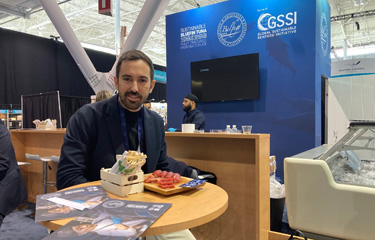In its quest to produce “the best bluefin tuna in the world,” Joan Grau, the head of marketing and communication at Balfegó, said his company has plenty of history to guide it.
The Tarragona, Spain-based firm has five generations of bluefin tuna-fishing experience to lean on, though Grau said the company is firmly focused on the future. From a revamped sales strategy to its ongoing commitment to sustainability to its collaborations with outside researchers and its own culinary team, Grau said Balfegó is committed to producing “not only to the world, but for the world.”
Balfegó uses purse-seiners to capture around 12,000 bluefin tuna in May and June each year around the Balearic Islands, then transports them in a large net-cage to its farm in L'Ametlla, Spain, where they are fed mackerel, sardines, herring, and anchovy. They are harvested – using the ikejime method, which was developed by Japanese sushi experts to minimize the stress and pain of the fish. The company harvests its tuna at the ideal fat content for the customer, with a range from 4 percent to 10 or 12 percent depending on demand.
Balfegó has also committed to the AENOR/APR certification, which was created in 2017 to create and verify responsible tuna fishing practices. Through its certification, Balfegó’s ranching, farming, and harvesting processes are all monitored and must meet or surpass standards set by the certification. The company’s AENOR-certified traceability program attaches a QR code to each harvested tuna, which allows anyone who scans it to see when and where the tuna was caught in the wild, which pool it was raised in, and its measurements and weight when it was slaughtered.
“This is not only for the chef, it’s for the consumer as well,” Grau told SeafoodSource. “Everyone appreciates greater transparency.”
Balfegó’s tuna is shipped immediately after it is ordered, and typically arrives 24 to 48 hours after the order is received, Grau said.
The company’s commitment to transparency extends even further, as it offers tours of its farm, and even snorkeling and scuba diving tours of its bluefin pens. And on the gastronomical side of the business, it operates a test kitchen in Barcelona called Tunataki, run by Michelin-starred chefs Martin Berasategui and Ekaitz Apraiz. The research kitchen and accompanying restaurant is dedicated to maximizing the use of all parts of the company’s harvested tuna, from the prized otoro, chutoro, and akami to the collagen, heart, blood, head meat, and bone marrow.
“It’s our space to communicate to consumers and receive feedback,” Grau said. “It’s also a gathering place for chefs from every part of the world, who come to our restaurant to learn and share ideas for how to work with this premium tuna product. And it’s a place where ideas are exchanged and where they can freely experiment with handling and cooking the tuna.”
When the company was founded in 2002, it started by selling 100 percent of its fish to the Japanese market. But Grau said the company is diversifying its markets – it now sells in 36 countries, led by the U.S., South Korea, and domestic sales inside Spain.
“Barcelona's culinary scene has just taken off, and Madrid’s has exploded as well, so now there’s so many great restaurants that want our tuna,” Grau said. “That has been great for us, because we can often do better in Europe in the U.S. with pricing.”
With Balfegó’s production restricted to around 2,400 kilograms annually, Grau said the company has a very limited amount of product, but that it won’t compromise its standards by selling fish not vetted through its certified process or from sources other than its own fishery in the Balearic Islands.
“We have a lot of demand – we cannot sell all we want. And that’s a good problem” Grau said. “The Balfegó family has a point of view of the world that we will only sell bluefin tuna, and we will only do it in a way that does not compromise our standards. And those standards are very high.”
Grau said with the recovery of the Mediterranean stocks of bluefin tuna, Balfegó is hopeful the fishery’s governing body, the International Commission for the Conservation of Atlantic Tunas (ICCAT), will increase the quota in coming years.
On 6 April, Balfegó’s bluefin tuna loin was named a finalist for the Best Hotel/Restaurant/Catering (HORECA) Product in the 2022 Seafood Excellence Global awards competition. The winner of the contest will be announced at an awards ceremony at the 2022 Seafood Expo Global in Barcelona on 26 April, 2022.
“With thousands of companies represented at Seafood Expo Global/Seafood Processing Global and 81 product applications, to be selected as a finalist of the Seafood Excellence Global Awards competition is a notable achievement,” Diversified Communications, the operator of Seafood Expo Global and the Seafood Excellence Global awards, said in a press release.
Photo courtesy of Cliff White/SeafoodSource







